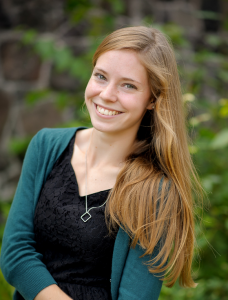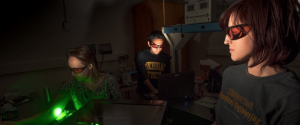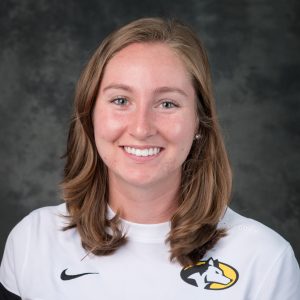 My name is Erin McKenzie and I am pursuing an undergraduate degree in biological sciences, with a pre-professional concentration.
My name is Erin McKenzie and I am pursuing an undergraduate degree in biological sciences, with a pre-professional concentration.
Preparing for medical school doesn’t just include studying for the MCAT and acing your interviews. The nice thing about Tech is that much of the learning experiences are designed to provide knowledge that is applicable to future education and careers. Tech isn’t an easy school, and many of the classes my peers and I took were also taken by chemical engineers, biochemists, and biomedical engineers. Having to network with peers to master material, to hone study skills, and to effectively manage time are all things required by Tech. Many of the teachers at Tech invest in their students’ learning and are open to going beyond what is expected to help a student in need.
“It’s understandable that medical schools like Tech students, since we have already mastered these personal skills in our undergraduate experiences that they expect in medical students.”
I applied to the Michigan State University Early Assurance Program (EAP) because a few local students I knew had, and from their experiences, I knew that Michigan State University, College of Human Medicine (MSU CHM) was where I wanted to complete my schooling. MSU CHM’s mission statement was what really drew me to them; their dedication to serving the underserved and excelling in primary care. The EAP gives students from colleges with fewer pre-medical resources a chance to apply before others who have more resources, to bring in students who are more apt to practice rural or inter-city.
I have always wanted to return to the Houghton-Hancock area, where I grew up, and to serve my rural community. MSU CHM has two certificate programs, Leadership in Rural Medicine (LRM) and Leadership in Medicine for the Underserved (LMU). Through LRM, I hope to participate in their Rural Physicians Program (RPP), which would allow me to complete my third and fourth years in Marquette, Michigan. Since I hope to practice primary care in a rural area, the RPP would allow me to be closer to the area I want to return to and to prepare for being a physician in an underserved area.
When applying for the EAP program, it is important to know that they prefer Michigan students from rural or underserved areas that want to return to the same type of area. If that’s not you, I would suggest still considering MSU and EAP. The application is free, since it’s an EAP, and it provides an opportunity to practice applying, writing essays and personal statements, and gathering letters of recommendation. Considering different schools gives you an idea of where you want to attend, and helps you choose the best school for you. Talking to students who have been accepted into medical school gives insights into interviews and medical curriculum, and reaching out to admission committees with specific questions are always options and very helpful. If you don’t get accepted into the school of your dreams, it’s OK! Schools have many applicants and can’t take everyone.
My dad, who has been a family physician for 29 years, often tells me, “An MD is an MD, it doesn’t matter where you go to school.”
A tip for interviews: be yourself. Practice and research what schools are looking for, and look into mission statements. Through interviews, schools are interested in learning who you are and what kind of student and person you are. Schools invest in students and their education and try to promote a good fit. A tip for the MCAT: study early. Everyone says to find a course/book that works for you. I used the Kaplan book series, and studied by reading, highlighting, and taking notes.
The Kaplan books went well with what I had learned at Tech and was outlined in a way that was very understandable and memorable. When you take practice tests, which I suggest doing many times, don’t let your score spook you. The real MCAT was not as hard as the Kaplan test, in my opinion. Also, your advisors can help you with your application processes and can help keep you on track.
Medical schools like to see commitment in their applicants, be it to sports, work, or extracurricular activities. In college I continued many activities I started in my youth. I worked, and joined several organizations at Tech including the Pre-Health Association (PHAT, of which I am the public and community service chair) and Blue Key National Honor Society (I am secretary). I’m also on the founding e-board and vice president of a new honor society, Alpha Epsilon Delta. It’s always easier to not join clubs and just do homework and relax, but devoting time now to extracurricular commitments is worth it in the long run. These experiences also give you good opportunities to get to know people who can write the letters of recommendation medical schools require.
All this hard work paid off. I was accepted to Michigan State University College of Human Medicine in June 2017.
 Michigan Tech was mentioned in an interview with Dr. Mona Hanna-Attisha, the pediatrician from Flint, Michigan who proved children in that city were exposed to lead in tap water. Hanna-Attisha describes an automobile accident she survived as a small child while her father was a postdoc at Michigan Tech.
Michigan Tech was mentioned in an interview with Dr. Mona Hanna-Attisha, the pediatrician from Flint, Michigan who proved children in that city were exposed to lead in tap water. Hanna-Attisha describes an automobile accident she survived as a small child while her father was a postdoc at Michigan Tech.
 In a student-led study, one hour of mindfulness meditation was shown to reduce anxiety and some cardiovascular risk markers.
In a student-led study, one hour of mindfulness meditation was shown to reduce anxiety and some cardiovascular risk markers.
 A moment that I thought about for many years had finally come.
A moment that I thought about for many years had finally come. Michigan Tech students interested in medicine, veterinary medicine and other health-related professions participated in the
Michigan Tech students interested in medicine, veterinary medicine and other health-related professions participated in the